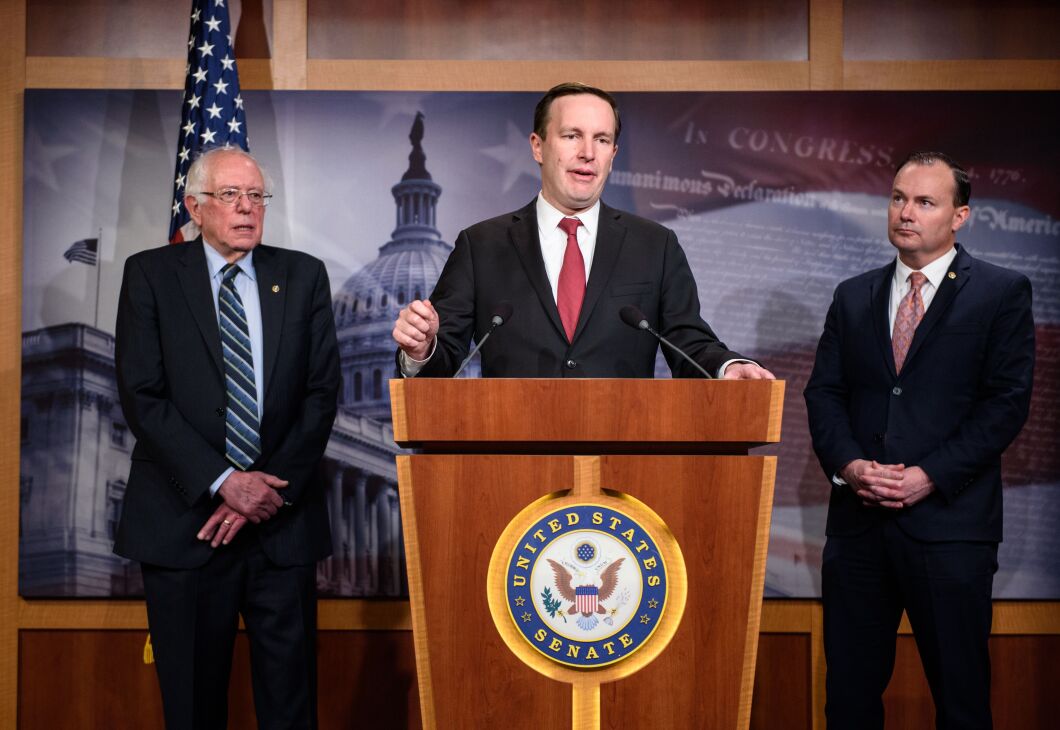
A bipartisan pair of senators is trying to force President Joe Biden’s administration to reevaluate its relationship with Saudi Arabia with new legislation targeting the human rights record of the oil-rich Middle Eastern ally.
Sens. Chris Murphy (D-CT) and Mike Lee (R-UT) introduced a privileged resolution this month that would require the State Department to submit to Congress a report on Saudi Arabia’s human rights abuses within 30 days. If the administration failed to do so, security aid to the kingdom would be cut off.
The bill is a novel approach to the debate on Washington’s alliance with Saudi Arabia, which Murphy says is not a reliable partner and often works against U.S. national security interests.
The senators, usually ideological foes on Senate legislation, are utilizing a never-before-used provision of the Foreign Assistance Act of 1961, which would fast-track consideration of the resolution. Under the law, the Senate Foreign Relations Committee would have 10 days to consider the measure before Murphy and Lee can force a floor vote to discharge it from the committee.
Although those 10 days have now passed — the resolution was introduced on March 15 — Murphy says he’s letting the process play out in committee before deciding whether to request a vote.
“We’re talking to the committee about their disposition,” he told the Washington Examiner on March 22. “You know, we have the right to bring it before the Senate after 10 days, but the committee can still work on it, you know, after the 10-day period of time.”
Murphy has for years railed against Saudi Arabia for backing the neighboring Yemeni government in a civil war that has killed thousands of civilians. He and Lee say the United States is complicit in those deaths due to its military assistance to the Saudis.
The complaints are a common refrain among Democrats, who argue America’s strategic partnership with the kingdom (which seeks to counter Iranian influence in the region) undermines America’s commitment to advance human rights abroad.

Those concerns reached a fever pitch in 2018 after the gruesome killing of Washington Post journalist Jamal Khashoggi, believed to be ordered by Saudi Crown Prince Mohammed bin Salman.
Biden channeled Democratic outrage on the campaign trail, promising to make the kingdom a “pariah.” But the president has sought to improve relations with the oil-producing country after Russia’s invasion of Ukraine, which sent already-high gas prices soaring.
Biden made a trip to Saudi Arabia last summer to lobby for higher oil production by OPEC+. Yet the diplomatic overtures ended after the cartel, led by the Saudis, announced in October it would cut output by 2 million barrels a day, a move that came weeks before the midterm elections.
The White House accused the Saudis of aiding Russia’s war effort by driving up oil revenues and promised to work with Congress to reevaluate America’s relationship with the kingdom in its aftermath. But five months later, Murphy says Biden has failed to live up to that pledge.
“The administration has made several public statements about reorienting Saudi policy. I’m disappointed we haven’t seen that reorientation,” Murphy said. “And I think it’s time for Congress to have a discussion about whether we’re going to continue business as usual with a country that doesn’t seem too interested in acting like our national security matters to them.”
The senator told the Washington Examiner the Biden administration has consulted with Congress on the topic, including multiple conversations with Murphy himself, but that the dialogue has yet to produce a change in strategy.
“They are very aware of my belief that our policy should have changed,” he said. “But I’ll let them speak for themselves as to why they generally kept things on a steady track notwithstanding all of the bad behavior we’re seeing every day.”
In addition to requiring an account of Saudi Arabia’s human rights violations, including its crackdown on political dissidents, Murphy and Lee’s resolution would require the administration to detail how the U.S. has responded to those abuses and evaluate whether continued military assistance is warranted.
After the report is submitted, Congress would then have the right to pass a joint resolution, privileged at a 50-vote threshold, ending or paring back U.S. military support for the kingdom. To become law, it would have to be signed by the president.
The Biden administration only allows defensive weapons to be sold to Saudi Arabia, and in 2021, it imposed sanctions and visa bans on Saudi agents whom it believes perpetrated the slaying of Khashoggi, penalties that notably exempted the crown prince. Yet Murphy believes the actions are not enough, and he has called for the Biden administration to “right-size” its relationship with Saudi Arabia, a shift that would include a freeze on all new military aid to the kingdom.
It’s a move that Sen. Bob Menendez (D-NJ), the chairman of the Senate Foreign Relations Committee, himself called for in response to the oil cuts in October.
Yet it’s not clear whether the resolution will get taken up by his panel. “I haven’t seen it,” Menendez told the Washington Examiner. “I’m not sure whether or not it’ll get a hearing in the committee.”
Asked about the timing of the measure, Murphy hinted that recent positive developments in the U.S.-Saudi relationship, such as last week’s release of a dual national imprisoned for tweets critical of the crown prince, may delay its consideration. Murphy does not expect it to come before the Senate before the April 3 recess.
This is not the first time Murphy has partnered with Lee, a constitutional conservative who says the president does not have the authority to insert the U.S. into Yemen’s civil war.
In 2019, the pair sponsored legislation to end America’s involvement in the conflict that made it all the way to the White House. Then-President Donald Trump, who stood by the crown prince despite Khashoggi’s death, vetoed the resolution, saying it was an “unnecessary, dangerous attempt” to weaken the office of the president.





